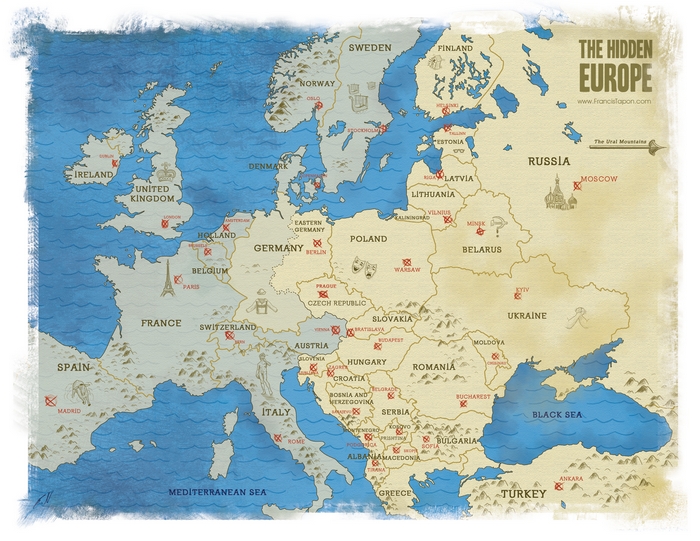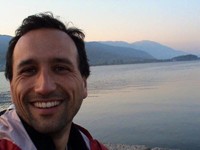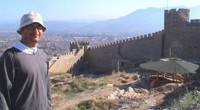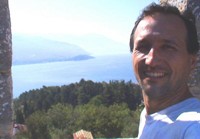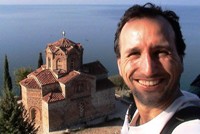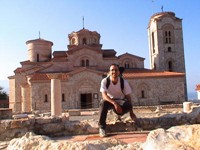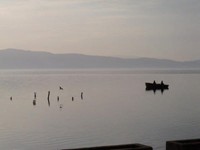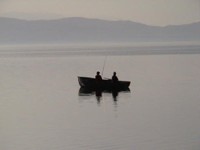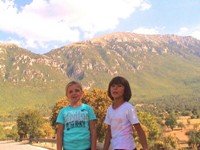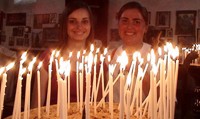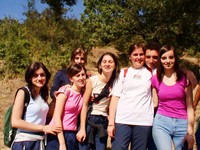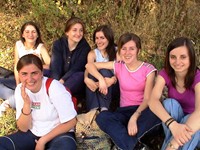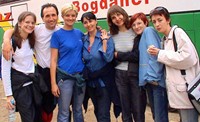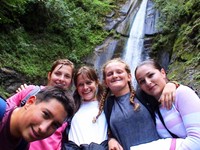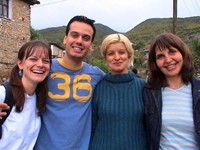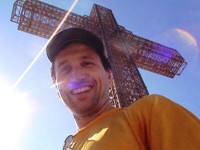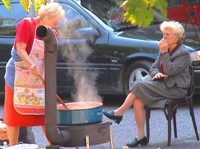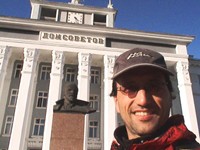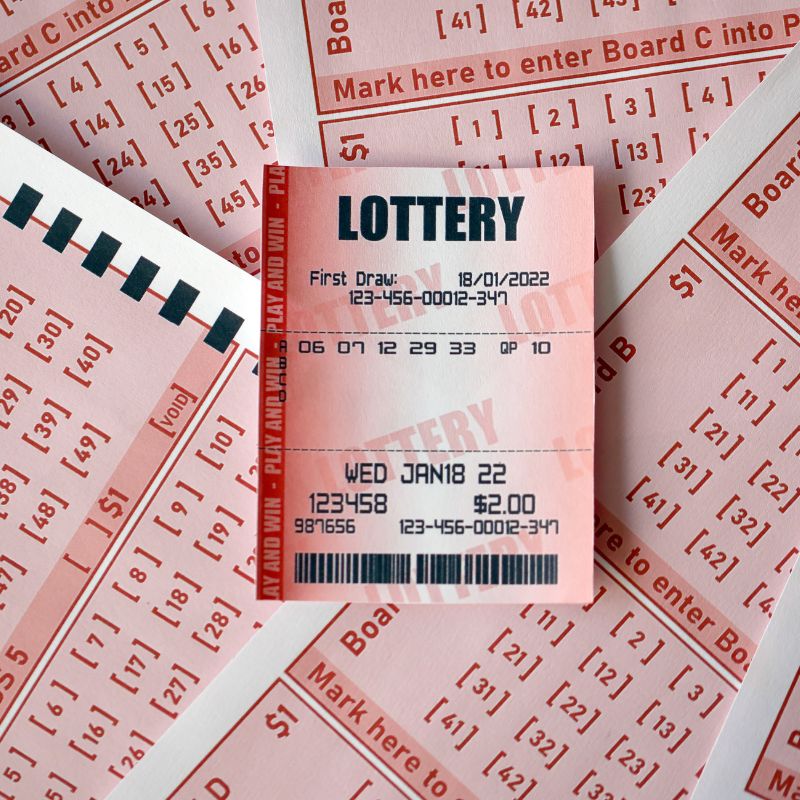Eastern Europe
Exploring the Hidden Europe in 2004 and 2008-2011
In 2004, I visited all 25 countries in Eastern Europe. You'll find the blog entries from that trip here. In 2008-2011, I returned to see what had changed since that time. With these two visits, five years apart, I accumulated enough material for my 750-page book, The Hidden Europe: What Eastern Europeans Can Teach Us.
This blog now has many excerpts from The Hidden Europe. But who the hell reads anymore? Just look at the best photos from Eastern Europe!
This map reflects how I define Eastern Europe. Eastern Europeans love to deny that they're in Eastern Europe. I tackle how and why I define Eastern Europe the way I do in the Introduction of The Hidden Europe.
Lithuania doesn't suck
Everybody I talked with, especially in Latvia and Estonia, gave me the impression that Lithuania was the ugly sister in the Baltic trinity.
I met one Lithuanian in Finland who said that Latvians have a saying, "You're as dumb as a Lithuanian."
Demonstrating their profound originality, the Lithuanians have their own saying, "You're as dumb as a Latvian."
This dumb Lithuanian that I met didn't impressed me when she was "surprised by how many black people there are in Finland."
I said, "What black people?"
I talked with one black guy from DC who had been living in Finland for 8 years and he said his mom asked, "So are there any other brothers in Finland?"
He answered, "Yeah, there's another one. We're good friends."
So when this Lithuanian said with such disdain that there were so many blacks, I started believing the Latvian expression.
However, when I finally arrived in Vilnius, the capital of Lithuania, I was blown away by its beauty, history, and grace. The streets are enchanting and the architecture is spectacular. It's bigger and more stunning than any other city I've seen in the Baltics. Indeed, it's one of the best cities in Europe.
OK, the city is great but you still gotta wonder about the Lithuanians themselves...
Lithuanian logic
Some credit the Lithuanians with causing the collapse of the Soviet Union (they were the first Baltic country to challenge the Russians in the late 1980s). However, at their first democratic elections in 1992 they promptly voted in the ex-communist leader. That makes sense, right? Maybe to the Lithuanians.
Lithuanians are stubborn
About 100km west of Vilnius is Lithuania's second city: Kaunas. This is the Town That Was Just Not Meant To Be.
Founded in the 13th century, Kaunas has been reduced to ashes an amazing 13 times before WWII. And, as you would expect, it received yet another pummeling during WWII.
Why the residents don't get a clue and just give up on their idea of having a town in that location, I just don't know. Forget about guys, it's just not gonna happen!
But no, there are 415,000 stubborn denizens in Kaunas today, eagerly awaiting the day they can rebuild their city for the 15th time.
But there's two reasons you should visit Lithuania's beautiful capital and white sand beaches now and not later:
1) Over here, U.N. inspectors!
A terrifying arsenal of decomposing chemical weapons could wreak damage to the coast of Lithuania - and poison the entire Baltic Sea. About 40,000 bombs and mines lie on the seabed 70 nautical miles off Kaipeda where Soviet forces sank German ships. I ate some fish here while I could.
2) Coming soon to Lithuania: Chornobyl II
Lithuania, the most nuclear power-dependent country in the world, gets 80% of its electricity from the plant near the Belarus border. Experts rank it among the world's most dangerous nuclear installations. As Scotty on Star Trek would say, "Captain, I don't think I can hold her together much longer, she's gonna blow!"
It's not the first time Belarus has an unstable nuclear power plant on its border. Chornobyl, in Ukraine, blew up in 1986 and most of the nuclear debris landed on Belarus. Given the winds, the same will happen if Lithuania's power plant melts down. Real estate agents in Belarus have a tough sell.
Despite the EU spending $250M in the last decade to improve the plant's safety, it's still not good enough. The EU now wants to completely shut it down, but doing that costs a staggering $3.5 billion!
Given that Lithuania's annual tax revenues are a paltry $1.5 billion (and they have $6.5 billion in debt), there is no way they're gonna pay for it. Maybe Belarus will pay...
Into Belarus
Speaking of Belarus, that is my next stop. I excited because this country is almost impossible to get into. So it's gotta be good, right?
Um... I'll find out.
July 21, 2004
I’ve never met so many nice people who have so many enemies.
I’m not talking about the Albanians anymore, now I’m talking about the Macedonians. They’re tied with the Albanians for being the nicest and warmest people in Eastern Europe. Yet their four neighbors each have a reason to hate the Macedonians.
1) ALBANIANS dislike that Macedonians don’t let them setup Albanians schools in the Macedonian towns where Albanian is the dominant language. They feel like second class citizens and started a mini war over it August 2001.
2) KOSOVARS don't like Macedonians who resent them for being refugees in their country.
3) BULGARIANS refuse to recognize the Macedonian language. They claim it’s basically Bulgarian.
4) GREEKS despise that Macedonians call their country “Macedonia.” They say it implies territorial claims on northern Greece.
It’s amazing that this tiny country of two million nice people hasn’t been crushed yet.
The Bulgarian issue is stupid. Bulgarians should be happy that at least one other country on the planet speaks something they can understand.
But the Greek point is hilarious. Greece forced Macedonia to call their country FYROM (Former Yugoslav Republic of Macedonia) so they could get in the UN. After the USA and some EU countries recognized FYROM, Greece imposed an economic embargo against Macedonia a closed its Thessaloniki port to trade.
When one American was crossing the border to Greece, the belligerent border asked her where she was coming from.
She said, “Macedonia.”
“No!” he shouted, “You’re coming from Skopje and NOW you’re in Macedonia!”
All this wasted energy because the Greeks don’t like the name of the Macedonian country. Don’t these guys have anything better to do?
Where is Macedonia?
That’s a tricky question and that’s exactly what the Greeks and Macedonians are bickering about like a bunch of 6 year olds.
Today Macedonia is an independent country. But Macedonia is also in Greece. Greece’s northernmost state is called Macedonia, just like America’s is called Alaska.
So will the real Macedonia please stand up?
They’re both right. As usual in the Balkans you have to go a few thousand years back to get to the root of the problem.
Alexander the Great was really called Alexander of Macedon, because he was from the nation of Macedonia. When Alex was a teenager Macedonia was both in today’s Macedonia and Greece’s Macedonia. That’s right, ancient Macedonia is now split in two, with one part in Greece and the other in Macedonia.
Of course, by the time Alexander of Macedon was in his late 20s he managed to stretch Macedonia deep into Persia. But luckily today nobody in the Middle East is calling their country Macedonia.
Greece contends that since Alexander of Macedon was born in the 4th century BC in Pella and Pella is today in Greece’s Macedonia, then they are the true Macedonia.
But does that mean the Greeks are right? What if leaders before and after Alexander were born in towns that are in today’s Macedonia? Does that make the Greeks claim wrong?
The answer is: WHO CARES?! THIS IS ALL SO STUPID AND CHILDISH!
It’s incredible that grown men waste their time on such idiocies.
A close analogy is if the state of California decided to cede from USA and become an independent country. They would probably call the country California. Logical, right?
But then imagine if Mexico flipped out because they have a state called Baja California (which they do). Imagine Mexico refusing to let California into the UN and forcing us to call ourselves the FUSSC (Former United States State of California)? And then placing a trade embargo against us? And lecturing peaceful tourists who cross the border about where the “real California” is?
That's what's happening here. And I know it's funny, but believe it or not, it's a BIG DEAL here.
So who is the bigger baby in this fight? The Greeks. Why?
First of all, they started it. OK, that’s a pretty childish thing to say, but it’s true.
I wonder if the Greeks would have had such a big problem with the Macedonian name, if Macedonia was packed with 50 million hot-tempered Serbs? The trigger-happy Serbs love having an excuse to punch anybody's face in. But it's not fair to blame the Greeks completely.
Macedonia shares a tiny bit of blame for being stubborn. They could have given in and just changed their damn name. After all, it’s just a name. I told this to my tour guide in Macedonia’s National Museum in Skopje (the capital). He bristled and said, “But we can’t, it’s who we are.”
“I got a better name for you,” I told him. “Roman Empire. Change it from Macedonia to Roman Empire. After all the Romans were here too.”
He smiled, “But then we might get Italy angry at us.”
“Well then, how about calling your country ‘Greece Sucks’?”
He laughed
Macedonia sliced and diced
I asked my thoughtful and patient tour guide, “Macedonia was much bigger just 100 years ago, so what happened? Who let out the air?”
The Turks ruled the Balkans for 500 years (except for Montenegro). In 1912 the natives had enough. Generals from Bulgaria, Serbia, Montenegro, and Greece conspired to overthrow the Turks. Weak and poor Macedonia wasn’t invited to the secret party.
The four generals succeeded and the Turks were out. Now they needed to divvy up the spoils of war: Macedonia. Only Montenegro didn’t a chunk because it didn’t share a border with Macedonia. Even weak Albania got a piece of Lake Ohrid because they struck a deal.
Although the Macedonians fought hard in the Balkan War thinking that they would get their independence and original borders, they were bummed to find out that the greater powers had sliced and diced their country into less than half of its original size.
Today, Macedonia’s neighbors would love to have another bite. Here's what is left.
Lake Ohrid
Lonely Planet puts Macedonia’s Lake Ohrid in its Top 10 list of things to see in Eastern Europe. UNESCO has it on its World Heritage List. It’s the deepest lake in the Balkans (294 meters/yards) and one of the world’s oldest. Clearly a must-see site if you’re near.
I had ultra high expectations and was slightly disappointed. Without a doubt, it’s a large and spectacular lake. Maybe I was expecting to see waterfalls flowing with milk and honey.
I rented a bike and almost got to the top of Galicica National Park which touches the lake. I rode down on an awesome dirt path all the way down and practically destroyed the bike.
The old town of Ohrid is precious with its narrow, steep cobble stoned streets, and many churches set on the edge of the lake. It's pretty awesome.
I stopped Bitola to see the impressive Heraclea ruins (Macedonians founded it in 4th century and Romans took it over later).
Hanging out with teenagers
A friend in San Francisco introduced me to Audrey, an American living in Macedonia. Audrey then introduced me to Zlatka, a 16-year girl living in the mountain town of Krushevo, Macedonia. Zlatka’s family loves having visitors and Zlatka offered to let me stay with her family a couple of days.
Zlatka spoke excellent English, although the rest of the family couldn’t. They were incredibly hospitable and warm. As I mentioned, Macedonians are tied with the Albanians for being the friendliest people in Eastern Europe.
That statement would perturb the Macedonians, because they hate the Albanians. What’s truly sad is that they’re taught to blindly hate the Albanians at such a young age. I went on a field trip with Zlatka’s school and spoke with many of her teenage classmates. Their utter loathing of Albanians was so absolute that it was scary.
Up until now I assumed that most of the Balkans equated Albanians with desperate immigrants. But these teenagers argued the opposite. They said that all Albanians are very rich.
One claimed, “They have at least 10 children. Two to send foreign countries to make money and send it home, three to send to wars, three to stay home and help with family, and two to be criminals.”
Another chimed in, “They have the best jobs in Macedonia and favor other Albanians. They are buying our land. They want to take part of Macedonia. They’re rich. And they all wear white hats.”
I asked him, “Have you been to Albania?”
He looked down to the ground, indicating no.
I told him, “I just was there a few days ago. Trust me, Macedonia is richer than Albania. You guys all need to go to Albania and learn a bit about their culture and country.”
The response was intense, “Albanians HATE Macedonians! They would KILL me there! I never ever want to go to Albania! I have absolutely no interest!”
Feeling the Albanians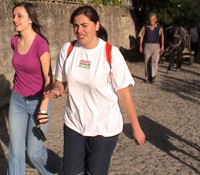
While Zlatka and I were waiting for my bus to Skopje, I saw a hansome man with sandy blonde hair and hypnotic blue eyes. "There you go, Zlatka, there's the man of your dreams." She had told me she dreams of finding her perfect Macedonian man. I thought I had a good candidate.
She choked. "He's Albanian," she said.
I was stunned. "How do you know?"
"He's done some work for my family. He's a carpenter."
"So if you didn't know that," I asked, "Would you have been able to tell he was an Albanian just by looking at him?"
"Oh yes, of course!"
"How?"
She looked at me intensely, "You can just feel them."
Really? I had to try. I closed my eyes. Relaxed my mind. I listened to my feelings.
However, all I could feel was Zlatka's stubborn and senseless hate.
Once again, the paradoxes in the Balkans sent my head spinning. My brain got completely mixed up in Macedonia. How could such lovely, friendly, and intelligent teenagers hate so blindly and absolutely?
Audrey later told me that the kids throughout the Balkans are taught to hate certain people from an early age. For example, Albanians are taught to blindly hate the Serbs and vice versa. These kids learn to hate from their parents and grandparents. They pass down the prejudices just like white Americans a hundred years ago taught their kids that blacks are the scum of the earth. Of course, even today some Americans still haven’t read the memo that African Americans are good people too.
Tragically, the Balkans can’t shake the vicious cycle of violence and hate. And the future looks bleak as long as today’s teenagers have such burning and senseless hatred in their hearts. They inability to forgive and move on hampers their future.
The Balkan time bomb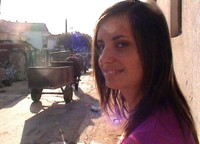
The first Macedonian I met was a wise, yet young archeologist who had lived in England for a couple of years. He ominously told me, “Since I’ve been back, I feel the tension rising here.”
The Macedonian government finally gave into Albanian pressure to have public Albanian schools in Macedonian cities where Albanians dominate (like Tetovo and Gostivar). But now the Albanians want Albanian Universities in Macedonia.
One politician offered a sensible solution of giving Albania the areas of Macedonia with over 85% Albanian presence in exchange for the territory around Lake Ohrid that used to be part of Macedonia. The politician’s career is now over.
People in the Balkans are so entrenched in their views, their tolerance for difference is so low, their nationalism (and ethnic pride) is so high, their view of history so skewed, their ability to forgive so low that it’s clear why they’re always fighting each other.
What’s the solution?
The archeologist told me, “What we need are jobs and a good economy. When people are working and making money, they don’t have time to think about the past. We’ll start looking forward instead of backward.”
He’s right. Tito ruled Yugoslavia for 40 years and was the most beloved dictator I’ve ever seen. Everyone in Yugoslavia prospered under his rule. Ethnic tensions were replaced with cooperation as Yugoslavia traded vigorously between the Communist East and Capitalist West. He played the delicate game so brilliantly that the people thrived under him.
However, the vast majority of people I talked with in the Balkans (especially the young people) said the future is bleak and they just want out.
A humble church in Skopje
I left southern Macedonia via Prilep and arrived at Skopje, the capital. A massive earthquake in 1963 leveled most of Skopje. They did a lousy job rebuilding it, but they have some nice mosques and churches.
The Church of Sveti Spas isn’t a spa, but it’s the most interesting building around. In the 17th century the Muslim dominated town had a law that no building could be taller than a mosque. These enterprising Christians wanted a nice high vaulted ceiling so they came up with a sensible solution: put half the church underground!
That’s right, it’s a half-buried church. The steeple isn’t high so they didn’t get in trouble with the ruling Turks and the Christians were happy to have a high ceiling.
What’s ironic is that today a massive cross, complete with bright lights, is perched at the summit of the mountain that overlooks Skopje (and all its mosques).
Teaching three classes in Macedonia
Audrey, Assistant Head of Nova Schools, invited me to teach three high school classes. As you can tell from my emails, I have an ability to talk forever, so I agreed.
The first class was a writing class. I focused on how to do travel writing. I gave them a few hints, but told them if they wanted some real tips they should sign up for my $295 workshop in San Francisco. No takers.
The next two classes were geography classes. They asked me questions about the 60 countries I've visited. I told them that everybody in America is extremely rich, everyone in Africa is hungry, and all the men in Albania wear white hats.
I really enjoyed teaching the classes. I suppose it helps that cute teenage girls were listening to my every word.
Field trip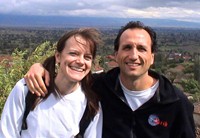
Audrey invited me to join her 190 high school students on a field trip to eastern Macedonia. Packed in four buses, we visited a few churches, small towns, and a waterfall.
The highlight was tossing a football with Audrey in a small town square. Macedonian girls stood in awe seeing a woman toss a perfect spiral.
When we left a group of boys followed me all the way to the bus. They couldn't believe a Californian was visiting their small town. I had to show them my CA driver's license to prove it.
Setting my sight to Kosovo
I didn’t want to go to Kosovo, because the region is still unstable. But the Balkan puzzle was incomplete without that crucial piece.
Macedonians told me that the worst of the Albanians were in Kosovo. That made me curious. I had heard the Serbs give their two cents about the war and it was only fair to hear what the Kosovars had to say. Moreover it would be just cool to camp in Kosovo.
September 30, 2004
"You must leave Moldova by midnight on Oct 14," the Moldavian consulate official told me in French.
"And if I don't?" I wondered aloud.
"You will have big problems," she assured me with a smile.
I wondered if Moldovans learned from their Romanian vampire neighbors and practiced impaling tourists who overstay their welcome.
My $30 transit visa gave me 3 days to get through Moldova and into Ukraine. The consulate is conveniently located at the border so they process the visa in minutes. EU citizens pay almost half the price as Americans so I whipped out my French passport to snag the discount.
Border crossing paradox
Why is it that the less desirable the country, the more difficult it is to get in it?
When I entered into Finland, Czech Republic, and Austria I could time the border crossing in seconds. However, when I entered Belarus, Kosovo, and Moldova I had to measure the process in hours.
You'd think that elite countries would be highly selective about who comes in and that undesirable countries would let any jackass in. Not so.
Another divided country
Another cramped bus, another little known country, another worthless currency, and another unpopular language. After 20 countries in 5 months, I'm used to this and still loving it! :-) I am also getting used to encountering divided countries:
- Finland (co-existing with Swedes)
- Estonia (with Russians)
- Various Balkan nations (with Albanians)
Moldova is one of the 23,473 little countries that came out of the former Soviet Union.
I could tell Americans that Moldova is located between Romania and Ukraine, but I might as well tell them it's between Togo and Mali, because most Americans have no clue where Romania and Ukraine are.
Moldova is yet another Eastern European nation that struggles to make its ethnic majority (Moldovans) get along with a significant ethnic minority (Russians). The Russians weren't always so significant in this country.
Moldovan football
Romania and Russian have been playing political football with Moldova for the last few centuries. Control of the region has traded back and forth more times than a stock on the New York Stock Exchange floor.
Most Moldovans hate the Russians. Why? Because they're bored and have nothing better to do.
But also because:
- After WWII the Russians imposed their Cyrillic alphabet on the Moldovan language (which is a dialect of Romanian, sounds like a Romance language, and uses Roman characters).
- Russian became the official language.
- In 1949, Russians deported 25,000 Moldova to Siberia and Kazakhstan, which is never fun.
- During the next couple of years Leonid Brezhnev, then first secretary of the central committee of the Moldovan Communist Party (and later leader of the USSR), deported 250,000 Moldovans.
- To dilute the Moldovan population further, they gave incentives for Russians to settle there.
Yes, this ethnic cleansing at its finest.
Homo sapiens did it when we were hunting down the last Neanderthals.
Humans, like all living things, seek to reproduce themselves while stamping out the competition. The more different someone is, the more we seek to obliterate them. Which brings me to the...
Easy four step ethnic cleansing plan!
In case you want to do some ethnic cleansing in your neighborhood, here are the four steps for you budding despots:
1. Conquer a territory.
2. Expel or kill the rebellious indigenous population.
3. Have your nation overwhelm the land through massive immigration.
4. Take away their contraceptives so your people reproduce fast.
If you do it right, in a couple of generations you will have transformed the language and ethnicity in the region! Voila! Instant empire expansion!
Alas, it almost never works. Those feisty indigenous people are just too hard to stamp out. The Serbs tried to follow the Four Step Ethnic Cleansing Plan, but NATO crashed their party.
Israel is doing its best to take over Palestine by following the Four Step Plan, but has been consistently a bit weak on executing Step 2. The Israelis need to more ruthless if they want to pave the way for a Greater Israel. Constructing a few concentration camps for the Palestinians might do the trick.
The Palestinians would love to do some of their own ethnic cleansing and get rid of the Jews, but they need a lot of work to fulfill their fantasy. But at least they have Step 4 down pat.
Sadly, as long as we have bigoted and unforgiving people, we'll have idiots trying to cleanse each other. Fortunately, it's hard to execute the Four Step Ethnic Cleansing Plan. Off the top of my head, the only examples of "successful" ethnic cleansing are:
- Nazi Germany's cleansing of the Jews (a few thousand are left in Eastern Europe compared to the original six million).
- The Spanish and Portuguese cleansing of South and Central America.
- The American cleansing of the Native Americans.
The last two examples "succeeded" mainly because the Old World inadvertently used biological warfare (through small pox and other diseases). That's hard to do today especially since we can't find the weapons of mass destruction in Iraq.
It also helped that the Old World had overwhelming technological superiority over the indigenous peoples. This helped finish off the few that didn't succumb to the bio-weapons.
Nazi Germany "succeeded" partly because of technological superiority, but mostly because they're just organized Germans. They're just good at getting things done.
Ok, back to Moldova
Believe or not, that diatribe is relevant to Moldova today. The Russians aren't efficient like the Germans. They left way too many stragglers behind and managed to only overtake one dinky region in Moldova.
Russians only make up 27% of the country overall. So like the Albanians who dominate small regions of Macedonia and Serbia, these Russians don't want to be marginalized into second class citizens.
Today Russians and Ukrainians make up over 50% of population east of the Nistru River. This tiny region in this tiny country is called Transdniestr.
Ethnic Ukrainians and Russians are concentrated in that region.
Like the Estonians, the Moldovans have reinstated their language, while the Russians still cling onto theirs. The bitter hate between them erupted in 1992 when a bloody civil war started along the river that divides them.
Crossing the river
Like Montenegro, Transdniestr is a tiny nation within a nation. Montenegro is within Serbia, but they use the Euro instead of the Serbian Dinar. Montenegro is nearly completely autonomous.
Transdniestr is similar. The Russians living there have their own currency, police force army, and its own (unofficial) borders. It was relatively painless to cross these borders, although I had to pay a tax for a one day visa and register with the military in two different places. The border is heavily policed. With the Lenin's face still ubiquitous it's clear that, like Belarus, Transdniestr is one of the last bastions of the silly Soviet system.
Inflation is rampant and the local currency is next to worthless. It all started in 1994 when the separatist government introduced the Transdnistran Rouble so they could be free of the Moldovan Lei. Inflation exploded and the rouble quickly added more zeros than Bill Gates's bank account.
Eventually a million roubles could barely get you a cup of coffee. So they slashed six zeros in 2001 and today inflation has cooled, but the economy is still in the toilet.
For the average person economic conditions are abysmal. Wages are low and poverty is rife. About two-thirds are elderly and impoverished. They long for the good old Soviet days when the government gave them money just for being old farts.
Transdniestrn trail magic
The signs at the 1992 War Memorial in Tiraspol, the capital of the Transniestr region, are only in Russian. It was late and the memorial was deserted due to the cold temperatures. But then I spotted two women and I asked them to help translate. I had little hope that they could speak English, but to my surprise one could! Barely.
Moldovans, like Belarusian, usually have one of two extreme reactions when I open my American mouth...
1) They break a wide smile: They are curious why a lone Californian is trotting through their unpopular country.
2) They act like I just told them that their mother is a whore: They glare at me, slowly squint their eyes, turn their head, and walk away. They don't even try answering my question. They're so rude it's comical.
It's rare that I get a ho-hum reaction.
Luckily, these ladies fit category #1. Within minutes they asked me if I wanted to join them for coffee. They offered to help me find a hotel and negotiate hard. They weren't satisfied with what the hotel was charging me (inflated "tourist prices"). Then they surprised me.
Alyssa, who is married and has two daughters, invited me to stay with her family. I was thrilled with another opportunity to stay with a local family. Such encounters are always highlights of any journey.
Alyssa served up a delicious late night noodle/potato/vegetable soup. The apartment in a 10 story building was humble, but functional. They have no hot water, but they do have gas. So I just heated up a pot of water, mixed it in a bigger bowl of cold water, and had a overdue sponge bath.
Don't call me Dostoevsky yet
Nobody in Alyssa's entourage could speak English well, which forced me to continue improving my Russian. Considering I've never taken a class in Russian, I've come a long way. I'm surprised how well I can communicate with Russians.
So how good is my Russian now?
I'm confident that I no longer speak like the Frankenstein monster. I'm much better. Nowadays I speak like Tarzan.
The Russian perspective
The Moldovans look at Russians like the Macedonians look at the Albanians: they're tainting the "purity" of their country. Moldovans dislike the Russians because they refuse to learn the Moldovan language and integrate with the rest of the population.
But I just like I went into Kosovo and Albania, I figured I'd hear the minority view. Russians aren't used to being second class citizens. But the Moldovans want to squeeze them out. The Russians believe that Moldova wants to unite with Romania (they share a similar language and culture). Meanwhile, the Russians have a natural affinity toward Russia. Today it's a stalemate with no end in sight.
The root cause of all this turmoil is the Russian's half-ass ethnic cleansing a half a century ago.
So the lesson folks is that if you're going to cleanse somebody's ass, make sure it's a deep cleaning.
Visiting Chisinau
I briefly visited Chisinau ("Kish-i-now"), the capital of Moldova. It's nothing special, but it's not terrible either. The crowds in the streets astounded me.
Why is it that no matter how shitty the economy, there's always people buying stuff on the streets, yapping on cell phones, wasting discretionary income on cigarettes, dyeing their gel-filled hair, and frequenting overpriced cafes?
The three lane highway to hell
With my visa soon set to expire, I set off to Ukraine on hell's highway. Moldova has a curious highway design: a three lane highway.
The two outer lanes go in opposite directions. The middle lane is a free for all. Use it for passing, but nobody has right of way. It's a constant game of chicken. When you're blasting down the middle lane, there's nothing stopping anyone going the opposite direction to challenge your position.
It's times like these that I just sit in the back of the bus and find God.
The language that teases
When I entered the Russian-controlled territory of Moldova I saw Russian written everywhere. This will prepare me for Ukraine and reminds me that it's a language that teases me.
Russians, Ukrainians, Bulgarians, Macedonians, and Serbians use the Cyrillic alphabet, which tortures those of us who have grown up on the Roman alphabet.
Part of me is happy that I can recognize some characters, but other times I just wish it was gibberish like Arabic and Chinese characters. At least when I go to Japan, I don't even try to read the signs. There is no hope.
But when I walk through a country that uses the Cyrillic alphabet I feel a glimmer of hope. Like when I travel through Italy or Brazil, I try to read the signs that have my trusty roman characters. This works in Italy, Brazil, France, and Spain because nearly all the letters sound like the English version.
For example, when you see "farmacia" you can say the word out loud and realize that it sounds like "pharmacy."
You'll naturally do the same when you come to Ukraine. Unfortunately, you'll be completely lost because many characters may look the same, but the pronunciation is completely different. As a result, you will go clinically insane.
Here's a crash course. I'll show you a letter in Cyrillic and then show you the equivalent sound in English.
(For you smarty pants who know how the Cyrillic characters really look, forgive me that I'm not using them. But most people who are on this list are unable to display the true Cyrillic letters, so I'm approximating how they look to the untrained eye.)
Cyrillic Alphabet = English Alphabet
B = V
r = g
j = y
H = N
H (with a slanted connecting dash) = i
n = p
p = r
c = s
x = kh (like "ch" in loch)
U = ts
W = sh
3 = z
Perhaps it still hasn't hit you as to why these slight changes can drive you bananas, let's play a game. I'll write the word as you might see walking through the street, and you try to guess what it means. Then I'll show you how it sounds if you were to pronounce it, and then what it means.
Let's start with my favorite. It's the one you see everywhere: PECTOPAH.
What the hell is a PECTOPAH? Use my handy cheat sheet above, and you'll realize that the P sounds like an R. The C is like an S. So instead of "PEC" say "RES". For the last 3 letters: remember the P is an R, and the H is an N. So: RES-TO-RAN. Restoran. That's right, restaurant.
The Bulgarians make it a bit easier on you, they write PECTOPAHT; hence, RESTORANT.
Whew!
Here's a few more:
bAHK = "baank" = bank
bAP = "bar"
nAPK = "paark" = park
TAKCH (slanted connector on H) = "Taxi"
Cnopt = "Sport"
KOMnyTEP = "Compooter" = Computer
Cynep = "Sooper" = Super
So "cynep mapket" is "super market"
3y = "Zoo"
nACnopt = "passport"
nPECCA = "Pressa" = Press (i.e., newspaper stand)
And one of my favorites...
rA3 = "Gaz" = Gas
Isn't this fun! So my greatest pastime when I'm in countries that have Cyrillic alphabet is slowly reading their signs. I mouth it out and then realize what it means. It's a tedious but fun process, especially when you get it!
Once I cross the Ukrainian border I'll have plenty of time to practice and I'm sure it'll get old quick.
OK, I gotta go, it's getting late, and I'm running out of rA3.
October 19, 2004
Your comment will be deleted if:
- It doesn't add value. (So don't just say, "Nice post!")
- You use a fake name, like "Cheap Hotels."
- You embed a self-serving link in your comment.
